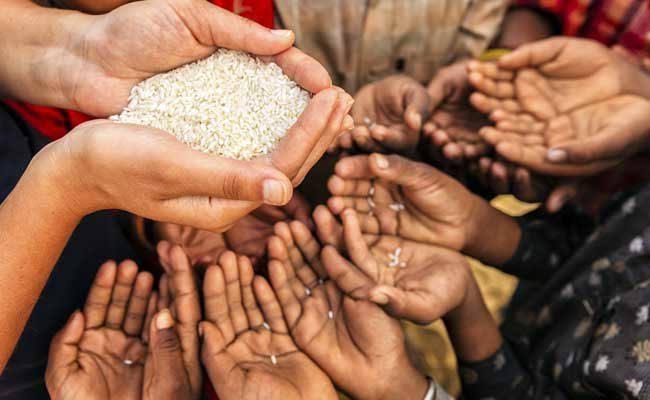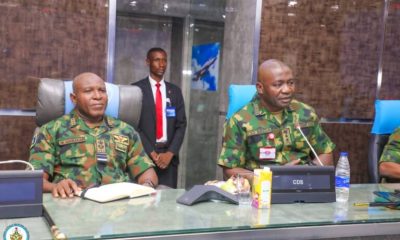Opinion
2023, Nigeria’s year of ghen-ghen

2023, Nigeria’s year of ghen-ghen
By Prince Charles Dickson Ph.D.
….Someone who has sold an old woman before knows the price of an oldman
Yes, like Prophet Jeroboam, of Wole Soyinka’s famed Jero Plays, I danced, with eyes closed and spoke in tongues not known to me and ask the higher powers what is in store for Nigeria, the clouds I saw were misty, it was moving like this and like that and ghen-ghen.
I saw that Nigeria will not break, Nigeria will not fail or fall, because it already has. We are not united, but we are one in corruption, one in greed, one in maladministration and misgovernance. And very well united in our religious and ethnic brinksmanship.
The year 2022 was a long year, a year that a lot of us want to forget for so many reasons and others would not forget for the obvious reasons. But either way what more can we do than be happy that we were finally able to navigate it somehow. There are a lot of reasons to be optimistic this year as well as a lot to be pessimistic about, a lot of us would be watching with an eagle eye as events unfold towards the General Elections, on the international scene the drama would certainly continue from where it stopped last year.
This essay would be a thrust of all I expect would be confronting us this year as a nation and as a people, it would be a confabulation of issues that if tackled can take us closer to the promised land and if neglected as usual will only be ingredients for disaster and a continued slide towards doom. And the signs show that the latter is inevitable!
We again from the beginning of this year will be battling against poverty, of the mind, of pocket and of sensibilities, despite seven years of reforms by the the outgoing Buhari administration, we would still remain one of the poorest in the globe, despite our natural and human resources, due to human mismanagement we would be battling to sustain meaningful development, and growth that is equal to the expectations of our people.
RELATED STORY: Buhari to sign 2023 budget Tuesday – Senate President
With the emergence of the Obis, Tinubus, Atikus and co., again though subtly we will still be concerned about tribal sentiments, ethnicity, religion and thus to a large extent none of or few of us are thinking nor discussing meritocracy. Around these three evils and many more we are likely to be subjected to more of political irresponsibility, rascality and political arithmetic that further alienates the rulers from the ruled.
We shall again be fighting against negative statistics of reality, we still are likely to remain one of the poorest, the statistics would be against us, whether corruption, malaria, we will still remain and continue to feature amongst nations with the worst badly run economies, a lot of ghen-ghen (events of crazy proportion) would occur.
We are insecure as a people, we are once more going to be constantly dependent on others after 63 years of paper independence, despite all that really and imagined rice pyramid, the rice we eat would still come from Thailand, any land but not our land, our drugs both fake and original, we have India, Germany and co. to thank for them.
This year, will we be able to make sense of our economic policies both micro and macro with currencies that bleach when washed mistakenly in a jean, while we say alhamdulillah for Innoson motors, our cars, computers, clothing, ball point pens all from obodo oyinbo. Will we shed off the skin of a nation that is full of contradictions, a nation of millions of school leavers without jobs, a nation of millions sick with curable diseases and ailments, a nation yet blessed with fertile land, with intelligent men and women in abundance. But being punished by a handful of crooks called leaders, being ruled by a collection of mediocres. A nation where amidst these poverty a man would steal billions.
The issues that stop us from attaining nationhood again would include the fact that we are all hypocrites, constantly waiting for any opportunity to better Judas Iscariot in the act of betrayal, go ask Wike, Atiku and Co. Topmost is, we shall again see leaders who grew up in Oshodi, schooled in Oshodi, lived there all their lives and get elected to serve Oshodi, and first thing on their card would be a familiarization tour of Oshodi. Our Leaders would still be exploring all means and any means necessary to steal from us.
With looting, corruption and insincerity, the ball again would be played on the pitch of underdevelopment and to think otherwise would be deceitful. In a world experiencing a time and season of global recession, our cry would still be trying to catch the Asian Tigers, even West African puppies have gone too far for comfort. Our life expectancy would likely drop further, even as more roads are likely to be unmotorable. We shall lose more kids at birth due to lack of infrastructure while leaders and the affluent treat their stomach disorder in Paris. More children would fail their qualifying exams especially with all the strikes of the preceding year. With less than 50cents a day, only the Almighty and our perseverance can keep us going. We shall suffer the rule of idiots, because sages are kept in dust bin, maybe we will have exceptions here and there in shaa Allah, but again, it is going to be like it was, while Tafawa Balewa wanted to be a broadcaster, the powers that be thought otherwise, Yakubu Gowon was not intellectually, psychologically, temperamentally, ready but the oligarchy said it must be him. Then we had an all-knowing Obj in his first coming who was forced on us by Danjuma, Shehu Yaradua and co. In Shagari it was no different, as the man that wanted to just be a Senator, a man that was not even at the Row Park venue of the NPN primaries emerged as winner without his consent, he was not even aware that his name was on the ballot. In 1998 fresh from prison, the Baba of Aso Rock had asked “how many Presidents did Nigeria want to make of him” but we did not listen. We witnessed a crying Mr. Buhari, who says he cannot wait to leave, has done his best whether it is good enough will be debated, because after all the shoeless one before him from Otueke is revered now. The Emilokans, Unifiers, and Obidients, men who crave it with the exception of one. These are the specs that we have to navigate this new year. INEC would be in the eye of the storm, as well as the Police, the ruling APC, PDP, the G5, EFCC, and many ruffians that the government has created. Things could be better, Nigeria can be great if only these institutions, if men and women of goodwill, can take the bull; if only you and I can make a concerted effort at being right in our own little way and fight in our own small corner. The nation must emerge or else we are wasting time again, we must fight for liberation from tribal loyalties, ethnic jingoism, religious parapoism, monetary godfatherism and many more. We will have to move a ladder up from hope and expectation to reality. In this New Year, we have to move towards a Nigeria, with Nigerians, we either continue the self deceit and watch the nation crumble like cookies. As I welcome us into this new year let me say that this is our nation, we are the only ones that can stop the drift, people that claim to love us are few, many nations are watching and waiting. Let us remember that we cannot continue to massage the ringworm and leave the sore. Almighty Allah we as a people thank You for a New Year and ask for the best, but are we working towards it—Time will tell.
Opinion
Why Press Freedom in Nigeria Remains Threatened

Why Press Freedom in Nigeria Remains Threatened
By Halima Abdulkadiri
Press freedom in Nigeria is protected by the country’s constitution, which guarantees freedom of the press and speech. However, in practice, press freedom in Nigeria faces several challenges.
Journalists in Nigeria are often subject to threats, harassment, and violence from both state and non-state actors. Government officials frequently use legal and regulatory measures to suppress critical reporting and stifle dissent. Intimidation, arrest, and detention of journalists are common tactics used to silence independent reporting.
Additionally, the media landscape in Nigeria is highly polarized and often controlled by wealthy individuals and political elites, leading to self-censorship and biased reporting. Many media organizations are financially dependent on government advertising revenue, which can compromise their editorial independence.
Despite these challenges, there are still many brave journalists and media outlets in Nigeria that continue to work tirelessly to hold those in power accountable and provide the public with vital information. Efforts are being made to improve press freedom in the country, including advocacy campaigns, legal reforms, and training programs for journalists.
Overall, while press freedom in Nigeria is under significant pressure, there are ongoing efforts to protect and promote the rights of journalists and the independence of the media.
The right of a journalist and the independence of the media are essential components of a free and democratic society.
Journalists have a responsibility to seek out and report on information that is in the public interest, hold those in power accountable, and serve as watchdogs for the public. The right to freedom of expression, including freedom of the press, is enshrined in international human rights instruments such as the Universal Declaration of Human Rights and the International Covenant on Civil and Political Rights. This right is crucial for ensuring transparency, accountability, and a well-informed citizenry.
The independence of the media is also crucial for ensuring that journalists can carry out their work without interference or influence from political or economic interests. Media outlets should be free from censorship, intimidation, or manipulation by governments, corporations, or other powerful entities. An independent media is necessary for providing diverse and balanced reporting, fostering public debate, and promoting the principles of democracy and good governance.
Protecting the rights of journalists and the independence of the media requires a commitment from governments, civil society, media organizations, and the public. Laws and policies that guarantee press freedom, safeguard journalists from violence and harassment, and ensure media plurality are essential. Journalists themselves must uphold ethical standards, pursue accuracy and fairness in reporting, and resist external pressures that may compromise their independence.
Ultimately, a free and independent media plays a crucial role in safeguarding democracy, promoting transparency, and protecting human rights. It is important for all members of society to support and defend the rights of journalists and the independence of the media.
Why Press Freedom in Nigeria Remains Threatened
Opinion
Olayemi Cardoso’s Dilemma

Olayemi Cardoso’s Dilemma
By Tunde Rahman
Those who know Mr. Olayemi Cardoso will agree he got his current job as the Governor of Central Bank of Nigeria on a platter of solid professional background and strong personal attributes. His pedigree is rich as his character is unsullied. Cardoso had a remarkable private sector career where he shone brilliantly in banking, stockbroking, and consulting.
Cardoso also came from a very solid family pedigree. Nigeria’s late Prime Minister, Sir Abubakar Tafawa Balewa, appointed his late father, Mr. Felix Bankole Cardoso, as the first Accountant-General of the Federation in 1963. The late elder Cardoso served with an enviable record until 1971.
Part of the remarkable private sector career of Olayemi Cardoso was his appointment as the Chairman of the Board of Citi Bank in Nigeria.
Read Also: Calido Rooftop Restaurant Kano
Cardoso began his public service journey when he became the Commissioner for Budget and Economic Planning in the cabinet of Asiwaju Bola Tinubu, Governor of Lagos State as he then was in 1999. In addition to superintending that ministry, Cardoso was charged with several other responsibilities, including heading important cabinet committees that birthed landmark agencies in the state. Cardoso was known for enforcing strict budgetary discipline that contributed significantly to the overall success of the Tinubu administration in Lagos. He refused to authorise the release of funds for projects or programmes that had no budgetary head. For all of that and many more, Cardoso was nicknamed the Headmaster.
Armed with a Bachelor of Science degree in Managerial and Administrative Studies and Masters in Public Administration from the prestigious Harvard Kennedy School of Government and parading strong personal attributes, Cardoso is obviously a perfect fit for the CBN top job. He is calm but firm, strict but fair, prudent but practical, straightforward, and honest with loads of integrity. These are the unique qualities he carried unto his job at the apex bank and his major selling points when, on September 23, 2023, he officially assumed office with the Senate confirmation of his appointment.
However, it does appear Cardoso will need much more than that to succeed in his present assignment. Under him, the CBN seems to be doing the right thing or doing things right: thinking and working on coming up with appropriate monetary policies, moving to rein in the rising foreign exchange rates and particularly achieve an appropriate value for the naira, which Cardoso believes has been undervalued.
But in the wake of the floating of the Naira, some of the variables shaping the value of the national currency, including limited production in the country as a result of insecurity, Nigerians’ high taste for imported products, dwindling exports, poor dollar remittances, humongous school fees of Nigerian students abroad and medical tourism all of which engendered a strong demand for dollar, far outweighing supply, seem to be clearly beyond his control.
Until these situations change for the better, no amount of monetary policies by the CBN will work any miracle, hence Cardoso’s predicament. For instance, in his presentation at the sectoral debate organised by the House of Representatives two weeks ago, the CBN governor lamented that the growing number of Nigerian students studying abroad, increasing medical tourism and food imports have led to the depreciation of the Naira against the Dollar. According to him, over the past decade, foreign exchange demand for education and healthcare totalled nearly $40 billion, surpassing the total current foreign exchange reserves of the CBN, while personal travel allowances accounted for a total of $58.7 billion during the same period.
Another critical yet intriguing factor but seemingly odd in Cardoso’s reckoning is the perception in some quarters of some of the decisions of the CBN, which the apex bank considers purely administrative, but which some others give strange connotations.
Olayemi Cardoso’s Dilemma
Feature
War Against Hunger: A call for collective action

War Against Hunger: A call for collective action
By Tosin Kolade
“A hungry man is an angry man”, according to James Howell, a Welsh writer and historian. This timeless quote is resonating in some parts of Nigeria.
Some citizens are taking to the street to protest against some government policies which they allege are exacerbating hunger. What started in Minna, Niger, has spread to Ibadan, Lagos Osun and Kano.
In Ibadan, the protesters commenced their march from the Mokola axis carrying placards with messages such as “End food hike and inflation,” “Insecurity not our birthright,” and “Mr President, this is not the hope, this is shege.”
They also chanted songs to show their grievances as armed policemen stood by to ensure the protesters conducted themselves within the ambits of the law.
There is a video currently circulating in the social media showing Nigerians looting a truck carrying farm produce.
This is akin to what happened in Venezuela, a country hit by acute economic hardship, as angry citizens forcefully entered shops and looted food items.
President Bola Tinubu’s decision to end the petrol subsidy regime on May 29, 2023, has triggered soaring food prices.
However, figures from World Food Programme indicate that Nigeria is not alone in this situation.
It says that in the 78 countries it operates, over 333 million people face acute food insecurity, unsure of where their next meal will come from.
The recent warning from the African Development Bank (AfDB) about potential unrest in Nigeria, coupled with rising living costs due to fuel subsidy removal and naira devaluation, adds urgency to the situation.
According to the AfDB, similar challenges in other African nations like Angola, Ethiopia, and Kenya could lead to internal conflicts and violence.
Read Also: NDLEA Nabs Grandpa, Vigilance Commander, Others For Dealing In Illicit Drugs
Similarly the Nigerian Red Cross Society (NRCS) sounded an urgent alarm, declaring that the country’s hunger crisis has reached a critical state.
Mr Abubakar Kende, the Secretary General of NRCS, emphasised the need for immediate attention and collective efforts to alleviate the suffering of vulnerable individuals.
While expressing deep concern about the escalating food insecurity in Nigeria, Kende called for decisive action from the government.
During the launch of a partnership between the Red Cross and Ecobank in Abuja, he highlighted the impact of rising fuel prices, leading to hyperinflation and pushing food prices beyond the means of many Nigerians.
Kende said that approximately 26.5 million Nigerians, including women and children, are currently facing acute hunger, urgently requiring assistance to prevent death and prolonged suffering.
He stressed that over half of Nigeria’s 36 states were food insecure, with the hunger crisis reaching alarming levels due to increased insecurity, inflation, extreme weather patterns, and global conflicts.
The Red Cross move collaboration with Ecobank aims to mobilise local resources to address the pressing hunger crisis, signaling the critical need for swift and coordinated action to mitigate the dire situation.
Worried by the impact of the situation on workers, the Nigeria Labour Congress (NLC) announced that there would be a two-day nationwide protest on Feb. 27 and 28.
The labour body highlighted the pressing need for collective action to address the escalating food crisis and the challenges faced by citizens in the wake of economic reforms.
But the Federal Government is not relenting in its efforts to mitigate the impact of its economic reforms on the citizens.
On Feb. 6, the Presidential Committee on Emergency Food Intervention convened at the Presidential Villa in Abuja to address the escalating cost of living in the country.
Under the chairmanship of Mr Femi Gbajabiamila, Chief of Staff to the President, the meeting had in attendance key figures such as Nuhu Ribadu (National Security Adviser).
Also in attendance were Yemi Cardoso (Central Bank of Nigeria governor), AlhajiTahir Mamman (Minister of Education) and Mr Wale Edun (Minister of Finance).
Others are Abubakar Kyari (Minister of Agriculture), along with Mustapha Shehuri (Minister of State for Agriculture).
Following the meeting, President Bola Tinubu, on Feb. 8, directed the immediate release of 42,000 metric tons of assorted food items from strategic reserves and the Rice Millers Association of Nigeria as a short term measure the address the challenge.
Alhaji Abubakar Kyari, the Minister of Agriculture and Food Security, has also assured that the federal government was committed to ensuring that the released grains reach impoverished Nigerians.
Collaborating with the National Emergency Management Agency (NEMA) and the Department of State Services (DSS), the Ministry of Agriculture is actively working to determine the recipients and locations for the distribution of these food items, he said.
Kyari said these efforts were in line with the broader agenda set during the first federal executive council meeting.
He said the agenda focused on food security, poverty reduction, economic growth, job creation, access to capital, inclusivity of women and youth, and addressing corruption and insecurity.
He clarified that the ministry’s blueprint includes immediate, short-term, medium, and long-term plans.
While the authorities are working round the clock to save the situation, insecurity seems to be putting spanner in the works.
This has prompted the National President of the All Farmers Association of Nigeria, Alhaji Kabiru Ibrahim, to urge farmers to establish vigilant groups to protect themselves amid increasing insecurity.
According to him, while the North faces concerns about bandit attacks, the South-West grapples with the herder-farmer crisis, and the South-East attributes insecurity to the proscribed Indigenous People of Biafra.
He cited the case of Zamfara where bandits allegedly take control of farms, demand access levies from farmers.
Ibrahim underscored the importance of farmers taking proactive measures to secure their farmland, stressing that the nation’s food production system is under severe strain.
Addressing the challenge, experts say, require a collective not only among Nigerians but also across Ministries, Departments and Agencies.
An Economist, Dr Sam Idaho, says for instance Ministry of Humanitarian Affairs mandates should include interventions to boost food production, distribution, and support to communities affected by hunger crisis.
Idaho highlighted the necessity for a comprehensive middle and long-term strategies, advocating investments in sustainable agricultural practices.
He said the intervention should also include the promotion of technology-driven farming, and the implementation of policies that address the root causes of the food crisis.
He recommended the establishment of an appeal fund, mobilising financial resources from both domestic and international sources to effectively combat the hunger crisis.
This fund, he said, could be utilised as emergency relief and long-term sustainable initiatives.
Experts say that developing state-specific agricultural plans, addressing local challenges, and collaborating with communities are essential in Nigeria’s battle against the hunger.
War Against Hunger: A call for collective action
-

 Business1 year ago
Business1 year agoNew Rates: ‘I borrowed money to finance this business…’ – Petroleum Marketer cries out over Non-supply of products by the NNPCL
-

 Entertainment3 months ago
Entertainment3 months agoBBNaija Season 9: TAMI Duo Evicted After Low Vote Count
-

 Health6 months ago
Health6 months agoOnly 58,000 doctors renewed licence out of 130,000 registered doctors – MDCN
-

 Business2 years ago
Business2 years agoNew Naira Notes: We Have No Information On The Supreme Court Ruling – CBN
-

 Defence & Security2 months ago
Defence & Security2 months agoOrganisers Demand IGP’s Dismissal Over Fatal Protest Crackdown
-

 Defence & Security2 months ago
Defence & Security2 months ago“Defence Chief Praises Strong Inter-Service Cooperation for Operational Successes”
-

 Opinion2 years ago
Opinion2 years agoAddressing Nigeria’s food security challenge through eco-friendly agriculture
-

 Entertainment2 months ago
Entertainment2 months agoBBNaija S9: ‘Radicals’ duo evicted from reality show


